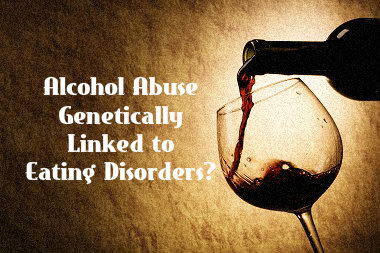Shared Genes May Link Eating Disorders And Alcohol Abuse In Teens
A study has concluded that for some having an eating disorder could also mean an increased risk for alcohol abuse. The reverse is also true, that certain people with alcohol dependency may face higher chances of developing certain kinds of eating disorders.
 For their study, researchers at the Washington University Medical School in St. Louis took a look at close to 6,000 fraternal and identical twins over age 18. Mental health practitioners and other experts have been aware for some time of a comorbidity between alcohol abuse and eating disorders in women, but this new study indicates that the link holds true for some men as well. The research has tended to focus on women since they’re most often the victims of disordered eating, but men suffer these illnesses as well, including binge eating.
For their study, researchers at the Washington University Medical School in St. Louis took a look at close to 6,000 fraternal and identical twins over age 18. Mental health practitioners and other experts have been aware for some time of a comorbidity between alcohol abuse and eating disorders in women, but this new study indicates that the link holds true for some men as well. The research has tended to focus on women since they’re most often the victims of disordered eating, but men suffer these illnesses as well, including binge eating.
Binge Eating
Binge eating occurs when a person consumes an overabundance of food in a single sitting. This overeating is often done in secret and is followed by feelings of guilt, shame and being out of control. It’s frequently accompanied by purging wherein the person compensates for the large food intake by either causing themselves to vomit or misuse laxatives or diuretics. Experts refer to behaviors like purging as compensatory behaviors. The researchers did not ask men about purging behaviors such as diuretic and laxative abuse, but instead relied upon data from prior male studies. They did ask the women in the study about any potential purging behaviors. Compensatory behaviors like purging are considered closely connected to alcohol abuse behaviors.
Similarities
Following the interviews, statistical methods were employed to calculate estimates for both the influence of environment and the influence of genes. Both eating disorders and alcohol dependency are thought to be a result of a mix of environmental and genetic causes. The statistical method carefully separated the two in order to gauge genetic impact alone. What they found was that the same genes were implicated in both alcohol dependency and binge eating disorders.
Around six percent of the females in the study had problems with alcohol dependency at one time or another during their life. Thirteen percent of them also struggled with binge eating and 14 percent of them also engaged in purging behaviors. More men (25 percent) reported alcohol dependency at some point and 11 percent of them had also engaged in binge eating.
This means that there was a .26 overall statistical correlation between binge eating and alcohol dependency (zero equals no genes in common and one equals every gene in common). For women the correlation was .32. The study team concluded that some of the very same genes which affect alcohol dependency also impact binge eating for both men and women along with compensatory behaviors (purging) in women.
Treatment
There is increased awareness of eating disorders in today’s culture, but diagnoses of anorexia nervosa and bulimia nervosa (a binge and purge eating disorder) continue to be relatively infrequent. When men or women are diagnosed and admitted into treatment, there is rarely any examination into alcohol abuse issues as part of recovery therapy.
Likewise, when men or women enter into alcohol treatment, it is uncommon for staff to inquire or investigate any potential eating disorders. The Washington University study suggests that, given the genetic link between these two illnesses, recovery strategies should target both kinds of compensatory behavior.
The study is scheduled for publication in the September volume of the Journal of Studies on Alcohol and Drugs.



